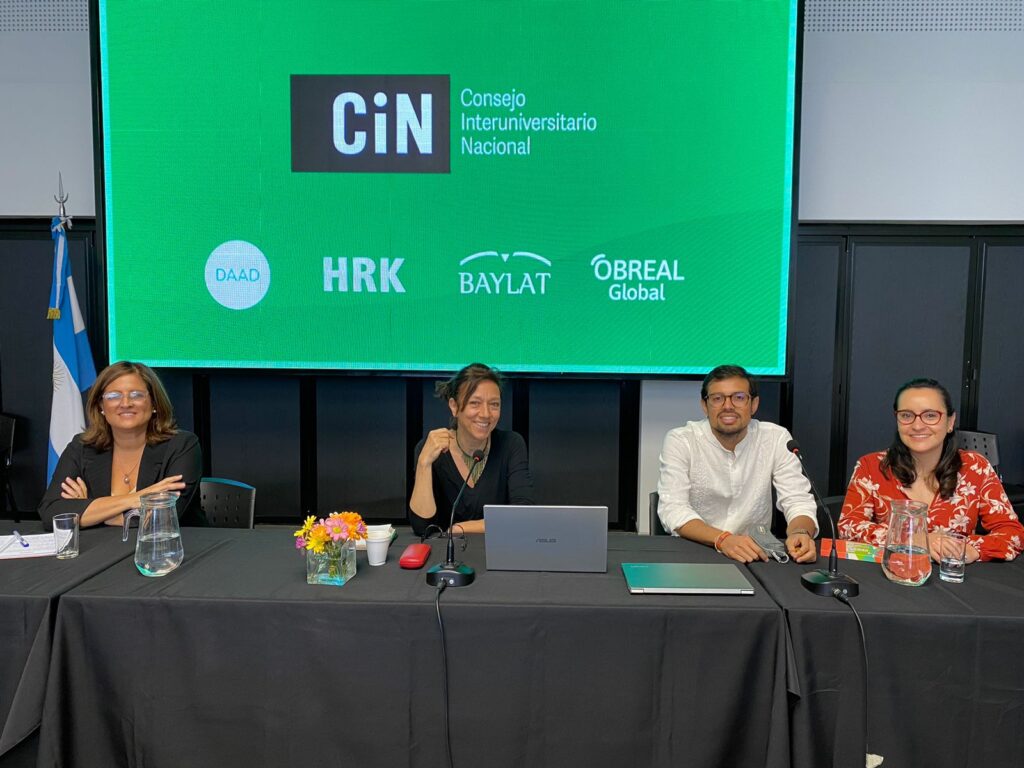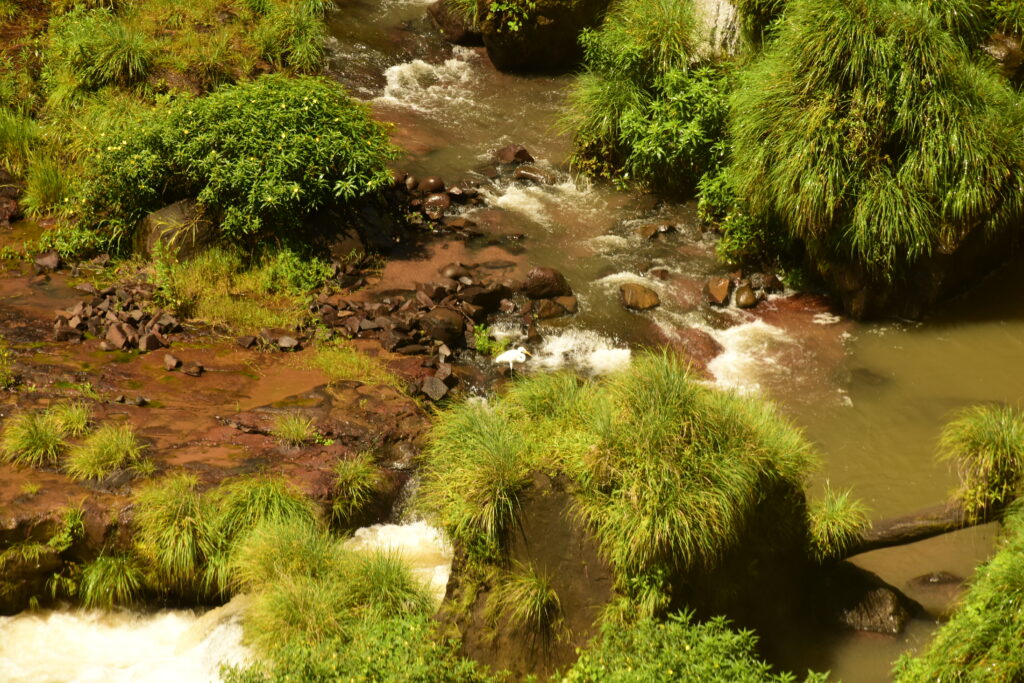By Laura Victoria Calderón, Nicolas Alexander Pérez Forero and Eva Shamiran Youkhana
The Doctoral Studies Support Programme (DSSP) and its team, funded by the German Academic Exchange Service (DAAD) as part of their SDG Graduate School Program, recently participated in the alternative event to the International Fair of Higher Education in Argentina (FIESA) in Buenos Aires, organised by the Consejo Interuniversitario Nacional (CIN) of Argentina, DAAD, Germany’s Federal Rectors’ Conference (HRK), the Bavarian University Centre for Latin America (BAYLAT) and OBREAL Global. After FIESA’s cancellation, the organizers of the alternative event “The challenges of the university system and internationalization” reached a wide participation of institutions and representatives from Argentina, Germany, Mexico and Colombia, between the 20th and 22nd of March. They exchanged experiences on the internationalisation of higher education and cooperation, as current and potential networks, from a national and global perspective.
Within the framework of this event, programs with a long record were presented, such as the German-Argentine University Centre (CUAA- DAHZ), OBREAL, University Network for Internationalisation in Teacher Education Cologne – Universität zu Köln – UNITE Cologne, the Latin American Academic Exchange Programme (PILA), and institutions such as the National Association of Universities and Higher Education Institutions (ANUIES) of Mexico, the Colombian Association of Universities (ASCUN) of Colombia, HRK, the CIN, the DAAD, among others. During the plenary sessions, some key issues of academic cooperation were discussed such as the challenges and lessons learned from the COVID-19 pandemic. In addition, the importance of building trusty relationships based on international cooperation to generate impacts on the comprehensive training of societies and the quality of higher education, the digitalisation of higher education and, in general, the future challenges of internationalisation.

As part of the parallel sessions, on the 22nd of March, in the central auditorium, the Doctoral Studies Support Program on Environmental Peace and Development in Colombia (DSSP) team made its presentation with the participation of Dr. Eva Youkhana, general coordinator, Laura Victoria Calderón, part of the academic coordination and Nicolás Pérez, leader of the Environmental Information System (SIAMI). Their presentation focused on introducing the general aspects of the cooperation they have been developing for more than 6 years between the bilateral partners, the National University of Colombia (UNAL) and the University of Bonn (UoB). They gave an insight into the main activities and contributions of their joint research agenda and the challenges and results that have been obtained so far from the consolidation of the DSSP open data information system. The interest and response of the different universities and university associations made the participation of the DSSP representatives a great success.
Before this event, the DSSP team made some visits to Argentinean academic peers in order to expand their collaboration networks, make themselves known and strengthen ties with Argentinean institutions outside the capital. In this regard, on the 19th of March, an inaugural visit was held at the facilities of the Institute of Subtropical Biology (IBS) of CONICET and the National University of Misiones (UNaM) in Puerto Iguazú. Lecturers Paula Tujague, Juliana Notarnicola, Carla Duarte (virtual participation) and researchers Fermín Chamorro and Yolanda Espejo discussed the main environmental problems in the province of Misiones, the challenges facing universities in Argentina and the importance of international cooperation in this context.


On the other hand, on March the 25th, the team visited the city of Rosario, together with CONICET doctoral researcher Francisco Preiti, from the National University of Rosario, with whom the ZEF is carrying out a cooperation project on environmental conflicts and the defence of water resources in Argentina. Francisco has been aware of the interests of the DSSP program, and this visit confirmed his interest in further collaboration also with the Colombian partner. The visit allowed for the introduction of the Institute of Environmental Studies (IDEA) of the UNAL and the Observatory of Environmental Conflicts (OCA), which IDEA is operating. Besides, this visit allowed for an additional exchange of approaches and perspectives on the conflicts associated with islands or wetlands, as common concepts of analysis and specifically for Rosario of the wetland complex “Entre Ríos”, located on the opposite side of the Paraná River, in front of the city. These conflicts are mainly associated with land tenure, the predominant illicit economies in the region, and the overlapping of biodiversity protection and ecosystem management instruments, all of which have been crossed by natural dynamics and anthropogenic actions, mainly induced burning.


Before leaving, the team was also able to visit the Library of the National Congress in Buenos Aires, which organizes projects to make better use of the rich historical archives and awards annual scholarships to allow greater access to this wide offer of studies, soon with an international focus. Finally, visits on March 26th and 27th to representatives of the Maria Sibylla Merian Centre for Advanced Latin American Studies (CALAS), Dr. Luciana Anapios and Dr. Lukas Christel, at the National University of San Martin (UNSAM), as well as visit to the headquarters of the National University of Comague (UNCo in Patagonia) in Buenos Aires completed the program. In Patagonia, environmental conflicts affecting the native populations, especially the Mapuche and Tehuelche, are a daily occurrence, so future cooperation would also make sense here.

With this participation in different academic scenarios in Argentina, the DSSP has been able to broaden its perspective on the potential expanding work with the country and has managed to outline topics of interest for future collaborations. Discussions with different professionals linked to CONICET and various universities in the interior of the country, also contribute to the objective of critically analysing the role of higher education in Latin America. Although it has recently been affected by the country’s multiple political and economic factors, hindering its progress and limiting its possibilities for action, it is necessary to advance and insist on its impact on societies and their territories. This is, where international cooperation plays a key role in focusing continuous efforts towards regions with multidimensional and complex challenges that facilitate the integration of knowledge and perspectives on development.
